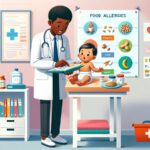Recognizing and managing food allergies in babies is a pivotal aspect of parenting that can significantly impact a child’s health and well-being. As new parents, understanding the nuances of food allergies can equip you with the knowledge to identify symptoms early, seek appropriate care, and implement dietary adjustments to safeguard your baby’s health. This comprehensive guide delves into what food allergies are, common signs to watch for, and practical tips for managing this condition in your little ones.
What Are Food Allergies in Babies?
Food allergies occur when a baby’s immune system mistakenly identifies a harmless food protein as a threat, leading to an allergic reaction. This immune response can manifest in various forms, ranging from mild symptoms to severe, life-threatening conditions. Understanding food allergies’ basics is crucial for early detection and management.
It’s important to distinguish between food allergies and food intolerances. While allergies involve the immune system and can cause serious reactions, intolerances primarily affect digestion and are generally less severe. Common allergens include dairy, eggs, peanuts, tree nuts, soy, wheat, fish, and shellfish.
How to Recognize Food Allergy Symptoms in Your Baby
Identifying food allergy symptoms early can be challenging, as they often mimic other conditions. Symptoms can appear within minutes to several hours after consuming the allergen and range from mild to severe. Common signs include hives, eczema flare-ups, vomiting, diarrhea, coughing, wheezing, and in severe cases, anaphylaxis.
It’s essential to monitor your baby’s reaction to new foods and note any adverse responses. An elimination diet, under a healthcare provider’s guidance, can help identify the offending food. For detailed information on managing eczema, a common symptom of food allergies, visit Atopic Dermatitis.
Managing Food Allergies: Practical Tips for Parents
Managing food allergies in babies involves vigilance and proactive strategies to avoid exposure to known allergens. It includes reading food labels carefully, communicating dietary restrictions to caregivers, and preparing safe meals. Additionally, it’s critical to have an action plan in case of accidental exposure, which should include the use of epinephrine auto-injectors for severe reactions.
Introducing potentially allergenic foods to your baby’s diet can be done safely with careful planning and consultation with a pediatrician. Early introduction, particularly for high-risk babies, may reduce the risk of developing food allergies. For more insights into feeding practices, consider exploring Bottle Feeding and Eating Solids.
When to Seek Medical Advice for Food Allergies
If you suspect your baby has a food allergy, it’s imperative to consult with a healthcare provider. They can offer guidance on diagnosis and management, including the possibility of allergy testing. Immediate medical attention is necessary for severe reactions, as they can be life-threatening.
Collaborating with an allergist can provide a tailored management plan for your baby, including strategies for avoiding allergens and dealing with accidental exposures. For comprehensive information on managing other common baby health concerns, check out Allergies and Anemia.
Creating a Food Allergy-Safe Environment at Home
Ensuring a safe environment for a baby with food allergies involves careful attention to food preparation and storage. This means separate cooking utensils and surfaces for allergen-free cooking and clear labeling of safe foods. Educating family members and visitors about your baby’s allergies is also critical to prevent cross-contamination.
It’s also beneficial to join support groups for families dealing with food allergies. These communities can offer valuable advice, emotional support, and practical tips for daily management. For additional resources on baby care and health, visiting Food Allergies can offer further guidance.
Conclusion
Navigating food allergies in babies requires a blend of vigilance, knowledge, and support. By understanding the signs, implementing preventive measures, and seeking professional advice, parents can effectively manage food allergies and ensure a healthy, happy life for their babies. Remember, you’re not alone in this journey, and resources are available to help you every step of the way.
For more information on baby health and wellness, explore our wide range of topics at Baby Whys and Hows.













